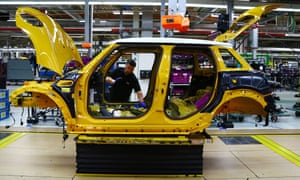A host of major manufacturers move their business from UK regulators and stockpile parts

All new car models sold in the UK and the EU must gain ‘type approval’ from regulators.
Photograph: Geoff Caddick/AFP/Getty Images
Carmakers are ramping up their preparations for a no-deal Brexit, with a host of major manufacturers moving regulatory approval for their vehicles from the UK to other parts of Europe.
Manufacturers are preparing alternative regulatory arrangements, a key concern for the closely supervised vehicle industry. Toyota, Honda and Bentley are among the car manufacturers with major British factories who have looked to new regulators in the EU since the Brexit vote.
Meanwhile, Vauxhall and BMW have joined the list of manufacturers to start stockpiling parts to cover at least a few days of disruption. Brexit border delays threaten to disrupt the supply of parts from the EU to the UK immediately after the planned departure date, on 29 March.
All new car models sold in the UK and the EU must gain “type approval” from regulators. Type approval from Britain’s Vehicle Certification Agency (VCA) is currently valid across Europe but the European commission in February warned carmakers that this will cease after Brexit, forcing multiple companies to look outside the UK.
The VCA is considered by industry insiders to be one of the more capable national agencies across the EU, meaning it has also been used by European manufacturers who do not have factories in the UK. Skoda in March said it would switch back to its home Czech authorities.
The Japanese manufacturers Toyota and Honda, which make cars in the UK, have started working with the Belgian authority. The luxury carmaker Bentley has chosen Luxembourg, although a company spokesperson said the move was made to align it with Volkswagen, its parent company.
Even James Bond cannot escape Brexit: Aston Martin Lagonda, which makes the film character’s cars, chose to gain type approval for its new Vantage in the EU. Vauxhall, another venerable British brand – albeit owned by France’s PSA Group – currently uses European agencies, underlining the integrated, criss-cross nature of the industry on either side of the Channel.
Jaguar Land Rover, the UK’s largest carmaker, certifies the “vast majority” of its vehicles with the VCA. A JLR spokesperson said it currently uses regulators in other EU countries “when needed” but it – and others such as luxury carmaker McLaren – may be forced to apply for type approvals outside the UK if there is no deal.
While preparations are ongoing, most large car manufacturers believe there is nothing they can realistically do to prevent damage from a no-deal Brexit, given the lean supply chains used in modern manufacturing. Delays of only a few hours at ports would be disastrous for companies that rely on parts arriving minutes before they are required in factories. The bosses of carmakers such as Ford and Nissan have warned that longer-term barriers to trade between the UK and the EU would threaten investment in British factories – potentially costing thousands of jobs in one of the few industrial success stories in Britain’s recent history.
Mike Hawes, the chief executive of the Society of Motor Manufacturers and Traders, the British industry body, said a no-deal Brexit was “not an option for the UK car industry”.
He said: “It would cause immediate and irreversible damage to our sector, putting business and thousands of jobs at risk. A no-deal scenario could result in severe disruption at the borders and, with over 1,100 trucks crossing into the UK every day, such delays would render just-in-time manufacturing impossible, stopping production. Stockpiling is not a viable alternative, given the scale and complexity of the products and thus the space needed.
“Current regulatory harmonisation allows the UK to sell vehicles across the many EU markets without having to seek approval from each individual country. Removing this permission would add significant costs and barriers, seriously undermining our competitiveness and threatening the future viability of the sector.”
In the longer term, divergence between regulations in the UK and the EU could raise costs for manufacturers who have to produce slightly different vehicles – costs that carmakers say would eventually be borne by consumers. If there is no deal on the mutual recognition of type approvals, all car manufacturers could be forced to apply in parallel to an EU agency alongside the UK’s Vehicle Certification Agency.
However, the industry is hopeful, and some are quietly confident, that a deal of some sort will be agreed to prevent a divergence in regulations, given the lack of appetite from executives at the largest companies.